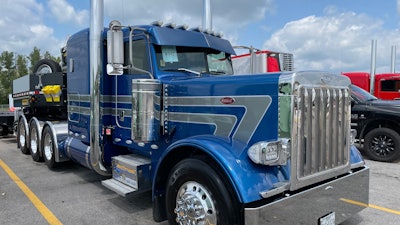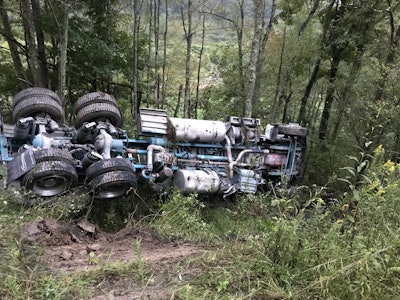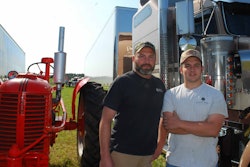Previously in this package: Oilfield hauling: Strategies to mitigate maintenance costs, high given on-/off-road nature of much of the work
 This tri-axle 2007 Peterbilt 379 is another of Truett Novosad's heavy-haul trucks chasing pipeline production across the country.
This tri-axle 2007 Peterbilt 379 is another of Truett Novosad's heavy-haul trucks chasing pipeline production across the country.
As the oilfield trucking business is varied, so are expectations and requirements of the drivers in those different segments. Many oilfield companies operate within a 150-air-mile radius of their home base and don’t require electronic logs in their trucks, taking advantage of the short-haul logbook exception in the hours of service regulations. The short-haul exception allows drivers operating within that radius, who start and end their duty period at the same reporting location, to run without a grid logbook.
There are also oilfield-specific hours of service exemptions available. A 24-hour restart is possible for drivers of the broad range of vehicles being used for “direct support of the operation of oil and gas well sites,” FMCSA said in 2012 guidance, “including transporting equipment and supplies (including water) to the site and waste or product away from the site, and moving equipment to, from or between oil and gas well sites.”

Other companies, like Truett Novosad’s Equipment Express small fleet, run nationwide chasing pipeline production.
Novosad said even though many oilfield drivers have tended to take more of a “rough and tough” outlook to get the job done no matter the cost, when he’s hiring he tends to look for drivers without prior oilfield experience and those who have respect and appreciation for the trucking industry and the equipment they’re driving.
“I don’t want the rough and tough -- I do want to get the job done, but I want it done fine, smooth and classy,” Novosad said, and the quality of his drivers’ equipment speaks to that. “We don’t want to tear anything up, and we want to look good doing it. Generally speaking, the oilfield can get it done in any way, form or fashion -- there’s nothing they can’t do. They’re generally a little tougher on equipment than what I like,” though
[Related: The rare-to-the-U.S. Faymonville heavy-haul trailer and '07 Pete of Equipment Express]
For Frank Bowman, experience is a must hauling frac sand. “It’s not for the faint of heart because you can die very easily,” he said. Working on oil wells in Pennsylvania, Ohio and West Virginia, many of the roads to get to the wells are several miles long with no lights. And unlike when he got started in the oilfield years ago, escorts seem ever more rare these days.
“If you miss a turn, cut a turn too short and the trailer runs off the road, there’s some 200-300-foot drops, and you’re going for a ride,” he said. “You must have experience.”
 Frank Bowman snapped this shot of a truck that didn't make a turn along a mountainside working the natural gas fields in West Virginia.
Frank Bowman snapped this shot of a truck that didn't make a turn along a mountainside working the natural gas fields in West Virginia.
He added that in parts of West Virginia, trucks have to hook to a bulldozer with a cable to be pulled up or let down a steep grade -- sometimes as steep as 15%-18%.
It’s a very hands-on job for drivers, he said, who need to have basic maintenance know-how on the equipment in order to handle minor breakdowns. Roadside services often can’t get to you, and the expenses associated with tow bills in those remote areas are just too high.
The time demands for oilfield drivers also make the job difficult. Owner-operator Clayton Driskill, when he was hauling directional drilling tools, was basically on-call 24/7. If a company calls you, he said, they expect you to be at your first pickup within an hour.
“You never knew when a rig was going to call for their tools,” he said. “There was never any planning,” or at least any that got all the way down the chain to the carrier. “Every once in a while, we got a heads up, but you never knew what time of day or night. It was really hard to have a life” outside the business.
Driskill added that any time he wanted to go out of town with his family or plan time off work, he had to take himself out of the rotation of carriers the companies would call. But when he would come back, a lot of other owner-ops and drivers would then be ahead of him. “To get back into the rotation, you might have to wait a week. It was always a rat race -- you never wanted to take yourself off the board to keep yourself in that rotation.”
Start back at the beginning of this 'Niche Hauls' installment: Truckers mostly filling up on profits in ‘feast or famine’ oilfield trucking niche
Also in this package:
** How to jumpstart a career trucking in oilfield services
**Oilfield hauling: Strategies to mitigate maintenance costs, high given on-/off-road nature of much of the work
**‘Rough and tough’ isn’t always part of the oilfield hauler’s job description











